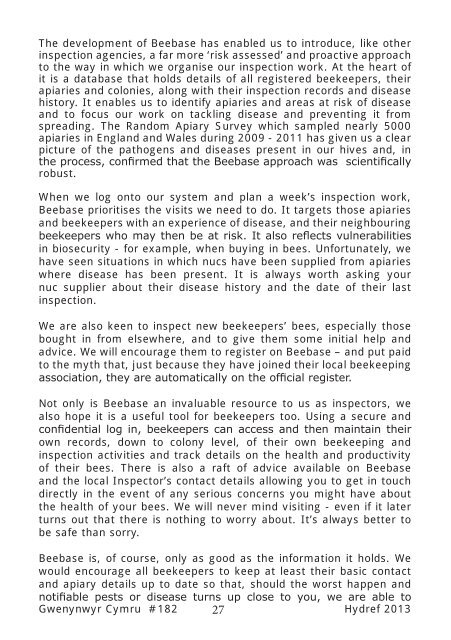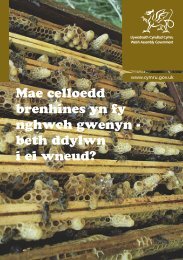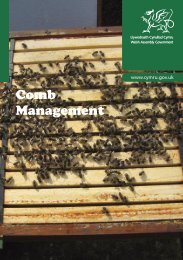Gwenynwyr Cymru The Welsh Beekeeper
Download Resource - Welsh Beekeepers' Association
Download Resource - Welsh Beekeepers' Association
- No tags were found...
You also want an ePaper? Increase the reach of your titles
YUMPU automatically turns print PDFs into web optimized ePapers that Google loves.
<strong>The</strong> development of Beebase has enabled us to introduce, like other<br />
inspection agencies, a far more ‘risk assessed’ and proactive approach<br />
to the way in which we organise our inspection work. At the heart of<br />
it is a database that holds details of all registered beekeepers, their<br />
apiaries and colonies, along with their inspection records and disease<br />
history. It enables us to identify apiaries and areas at risk of disease<br />
and to focus our work on tackling disease and preventing it from<br />
spreading. <strong>The</strong> Random Apiary Survey which sampled nearly 5000<br />
apiaries in England and Wales during 2009 - 2011 has given us a clear<br />
picture of the pathogens and diseases present in our hives and, in<br />
the process, confirmed that the Beebase approach was scientifically<br />
robust.<br />
When we log onto our system and plan a week’s inspection work,<br />
Beebase prioritises the visits we need to do. It targets those apiaries<br />
and beekeepers with an experience of disease, and their neighbouring<br />
beekeepers who may then be at risk. It also reflects vulnerabilities<br />
in biosecurity - for example, when buying in bees. Unfortunately, we<br />
have seen situations in which nucs have been supplied from apiaries<br />
where disease has been present. It is always worth asking your<br />
nuc supplier about their disease history and the date of their last<br />
inspection.<br />
We are also keen to inspect new beekeepers’ bees, especially those<br />
bought in from elsewhere, and to give them some initial help and<br />
advice. We will encourage them to register on Beebase – and put paid<br />
to the myth that, just because they have joined their local beekeeping<br />
association, they are automatically on the official register.<br />
Not only is Beebase an invaluable resource to us as inspectors, we<br />
also hope it is a useful tool for beekeepers too. Using a secure and<br />
confidential log in, beekeepers can access and then maintain their<br />
own records, down to colony level, of their own beekeeping and<br />
inspection activities and track details on the health and productivity<br />
of their bees. <strong>The</strong>re is also a raft of advice available on Beebase<br />
and the local Inspector’s contact details allowing you to get in touch<br />
directly in the event of any serious concerns you might have about<br />
the health of your bees. We will never mind visiting - even if it later<br />
turns out that there is nothing to worry about. It’s always better to<br />
be safe than sorry.<br />
Beebase is, of course, only as good as the information it holds. We<br />
would encourage all beekeepers to keep at least their basic contact<br />
and apiary details up to date so that, should the worst happen and<br />
notifiable pests or disease turns up close to you, we are able to<br />
<strong>Gwenynwyr</strong> <strong>Cymru</strong> #182 27<br />
Hydref 2013




